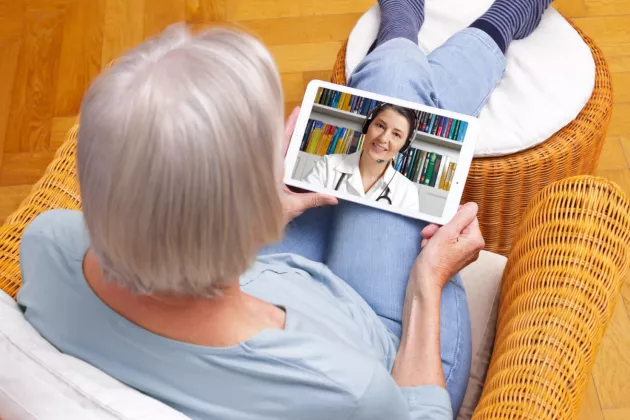In March 2020, based on research from China in the early stages of the pandemic, cancer patients were identified as an at-risk group for severe Covid-19, the disease caused by the now world-famous corona virus, SARS-CoV-2. Due to these circumstances, many cancer treatments were revised with the aim of minimising the risk of infection for patients.
“We had to redirect our activities at the clinic fairly quickly, to protect our patients,” says Mats Jerkeman, professor of medical oncology at the Lund University Cancer Centre, LUCC.
One clear change meant minimising the number of patient visits to the clinic – instead, physicians, nurses and patients met via telephone or video call. Another change led to intravenous treatment being replaced in some cases by treatment in tablet form, which can be administered in the home. Everything was done to reduce the number of occasions on which a patient could potentially be exposed to infection.
Age is a greater risk factor
As more research is conducted into the corona virus, age has proven to be a much stronger risk factor than a cancer diagnosis – which has been apparent in the high number of deaths in the higher age groups, not only in Sweden but in all parts of the world.
“Now we have learnt more about what increases the risk of severe Covid-19. Advanced age, often combined with cardiovascular disease and diabetes, rather than cancer, constitutes a high risk. For cancer, on the other hand, we can see that patients with haematological malignities have an increased risk of falling ill. This concerns cancers such as leukaemias, myelomas and lymphomas.”
Why haematological cancer, in particular, constitutes a greater risk of Covid-19 is unclear, says Mats Jerkeman. More research needs to be done to clarify and analyse the correlation.
Patients’ experiences of the change
Could the pandemic pave the way for revised cancer treatments? That depends on how last spring’s change in treatment procedures affected patient health, survival and mental well-being. Mats Jerkeman and his colleagues will now evaluate how the patients themselves experienced the changes implemented in the spring, and their physical impact. It may be possible to incorporate some of the changes in future approaches to treating patients, regardless of whether they constitute an at-risk group.
“We believe that many people might appreciate not needing to visit the hospital so often. Besides reducing the risk of infection, this approach may leave the patients themselves with more energy for other things when they have fewer hospital visits.”
Mats Jerkeman reflects on the fact that some working methods will probably become part of regular activities. One example is telephone and video conferences. They have many advantages, as physicians and nurses can meet patients despite them suffering a bit of a cold or feeling tired. For the patients, on the other hand, telephone consultations can be less exhausting and also entail a reduced risk of infection with diseases such as Covid-19, as well as colds or influenza.
“Within primary healthcare, companies such as Kry and other operators have already pushed digitisation forward. Maybe online meetings will become increasingly important in advanced cancer care as well. We now look forward to seeing what the outcome of the changes has been. On the basis of our results, we can then decide how to move forward”, he concludes.
Link to original article published by Noomi Egan 11 November 2020

